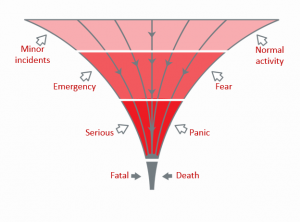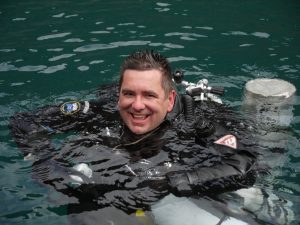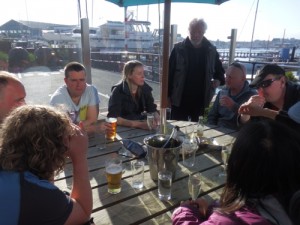For more years than I care to remember, I’ve been giving diving lectures that are all, to some extent, about managing risk and being safe. I particularly enjoy doing the one that includes the ‘incident pit’, because I have a stock of personal stories I can draw on. I’ve always thought that a good story is worth a thousand didactic bullet points, especially when illustrated by my very basic stick-diver drawings.
So I was keen to attend the Clidive lecture given recently by Gareth Lock, a highly qualified technical diver and retired RAF officer who used to supervise and instruct fliers. Drawing on his experience of these high-risk activities, in 2012 he started a PhD examining the role of human factors in scuba diving incidents, and has recently developed a number of online and face-to-face programmes aimed at divers and instructors, which focus on human factors and the development of ‘non-technical’ skills.
What is ‘Just Culture’?
The concept that underpins his work is called ‘Just Culture’ – an approach that is well established in ‘safety-critical’ industries, such as aviation, the oil industry, the marine industry and the health service. Just do a web-search, and you’ll find lots of material online.
A ‘just’ culture is one in which both the systems and the culture exist in which mistakes can be openly discussed and learnt from, but also one in which people are held to account for actual negligence or violation of safety procedures. It recognises that to err is human, that few of us actively set out to make mistakes, and that we are all part of a complex system that makes attempting to attribute blame to a single cause a pointless exercise.
Just Culture recognises that hindsight is a wonderful thing, but that it rarely helps us to understand why people made the decisions they did – good or bad – or to learn from them and improve our own practice. Rather it often results in new rules or procedures being introduced that in themselves won’t make us better at what we do.
Gareth points out that you can’t train people or write rules to deal with every situation that might arise. When unexpected things happen, we draw on our non-technical skills and our ‘bank’ of learnt experience to find the best solution.
What might it look like in practice?
So what does all of this mean for you and me? And for Clidive as a club?
Well, if you are a diver, like me you will have had any number of diving ‘incidents’, however minor. If you are reading this, they must have been successfully resolved, at least to the extent that you are still here and probably still diving. But when you had an incident did you discuss it with the rest of the people on your trip? Did you discuss it in detail with your buddy? Was your buddy even aware of the incident, or did it seem too minor to discuss, and maybe you were a bit embarrassed to admit to it anyway? Or did you feel it was somebody else’s fault – your buddy’s, the dive manager’s, the cox’s – but you didn’t know how to raise it in a non-confrontational way?
If I’ve understood Gareth’s lecture correctly, a good dive club is a learning dive club – one where we can all openly talk about things that go wrong in a way that isn’t about blame or shame, but about being able to learn from them. He uses the phrase ‘context-rich stories’, which I think means hearing from the people involved, understanding what they were thinking and feeling as they made the decisions they did, being able to put yourself in their dive boots and think “what would I have done in that situation?”.
I know that our Diving Officer, Chris, is keen to try to develop such a culture in the club, and is thinking about ways of doing that. We can all start by talking about things that happen to us and
encouraging others to share their stories by listening to them and asking questions in a non-judgemental way. What happens on a dive trip really shouldn’t stay on a dive trip!
Perhaps we should also think about taking some of Gareth’s courses. He has offered Clidive members a discount on his online micro-class (nine 15-minute modules) until the end of the month, making it available for £46. If you are interested but weren’t at the lecture, contact training@clidive.co.uk for the appropriate code.





 We are an LGBTQIA+ friendly club
We are an LGBTQIA+ friendly club